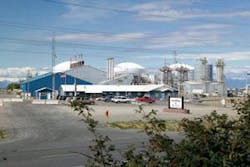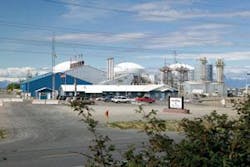Alaska backs Kenai LNG export license extension
Alaska Gov. Sarah Palin and other state officials said they support an application by Marathon Oil Co. and ConocoPhillips Alaska Natural Gas Corp. for a 2-year federal extension of an export license for their Kenai LNG plant at Nikiski, on Alaska’s Kenai Peninsula.
The application for extension of the export license was filed with the US Department of Energy in January 2007. If granted, the extension would run through Mar. 31, 2011.
If the DOE does not extend the export license, the plant would close in March 2009. If the license is granted, both Marathon and ConocoPhillips vowed to drill more Cook Inlet gas wells.
The state of Alaska believes continued operation of the Kenai LNG plant is in “the best interest of the nation,” Palin said during a Jan. 3 news conference
ConocoPhillips has a 70% share interest in the Kenai LNG project, which uses Phillips’s Optimized Cascade process technology. Marathon owns the remaining 30%. The Kenai LNG plant started operations in 1969 and was the first complex to ship LNG volumes to Japan.
Palin said the plant provides a gas reliability role in the Cook Inlet region supply and demand balance. The plant has the ability to divert gas from export to Alaska markets for local heating and electricity generation during peak demand.
If certain south-central Alaska gas supply milestones are not met, the companies agreed to reduce exports below the LNG export quantities requested in the federal application. Kenai LNG is sold to Japan, although some gas previously has been diverted to Alaska.
The state agreement noted that the LNG plant has a positive impact on investment in regional gas development, provides employment in the Kenai Peninsula Borough, and provides royalty revenues and tax income to the state.
The agreement calls for ConocoPhillips and Marathon to continue negotiations with utilities Enstar Natural Gas Co. and Chugach Electric Association Inc. regarding gas supply agreements to satisfy Alaska gas supply needs. No price agreements have been reached.
Drilling plans
If the federal export license is extended, ConocoPhillips agreed to approve 2008 drilling plans for at least two wells, and Marathon agreed to approve a minimum of five wells.
Jim Bowles, president of ConocoPhillips Alaska Inc., said his company plans to move a rig to Beluga field to drill two wells this year, and it also might drill two or three wells from Tyonek platform.
“Already, it’s kicking off new plans and new thinking as far as gas development,” Bowles said of the agreement with the state.
Marathon will drill 5-12 wells as a result of the agreement, said Steven Hinchman, the company’s senior vice president of worldwide production.
ConocoPhillips and Marathon also agreed to make data available to other potential oil and gas explorers in the Cook Inlet region to encourage exploration and development.
The agreement includes a framework for cooperation among the Alaska, ConocoPhillips, and Marathon on future applications to the DOE for additional LNG export authorizations.
A goal is to make at least 30 MMscfd of plant inlet capacity available for gas purchased from other producers, the agreement said.

